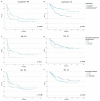Development of Lymphopenia during Therapy with Immune Checkpoint Inhibitors Is Associated with Poor Outcome in Metastatic Cutaneous Melanoma
- PMID: 35805052
- PMCID: PMC9265779
- DOI: 10.3390/cancers14133282
Development of Lymphopenia during Therapy with Immune Checkpoint Inhibitors Is Associated with Poor Outcome in Metastatic Cutaneous Melanoma
Abstract
Predictive markers for immune checkpoint inhibitor (ICI) therapy are needed. Thus, baseline blood counts have been investigated as biomarkers, showing that lymphopenia at the start of therapy with (ICI) is associated with a worse outcome in metastatic melanoma. We investigated the relationship between the occurrence of lymphopenia under ICI and disease outcome. Patients with metastatic melanoma who had undergone therapy with ICI were identified in our database. Only patients with a normal lymphocyte count at baseline were included in this retrospective study. Progression-free survival (PFS) and overall survival (OS) were compared between patients in which lymphopenia occurred during ICI therapy and those who did not develop lymphopenia. In total, 116 patients were analyzed. Lymphopenia occurred in 42.2% of patients, with a mean onset after 17 weeks (range 1-180 weeks). The occurrence of lymphopenia during immunotherapy was significantly associated with a shorter PFS and OS. Patients who developed lymphopenia (n = 49) had a mean PFS of 13.3 months (range 1-67 months) compared to 16.9 months (range 1-73 months) for patients who did not develop lymphopenia (n = 67; p = 0.025). Similarly, patients with lymphopenia had a significantly shorter OS of 28.1 months (range 2-70 months) compared with 36.8 months (range 4-106 months) in patients who did not develop lymphopenia (p = 0.01). Patients with metastatic melanoma who develop lymphopenia during ICI therapy have a worse prognosis with significantly shorter PFS and OS compared with patients who do not develop lymphopenia.
Keywords: immune checkpoint inhibitors; lymphopenia; melanoma; outcome; predictive markers.
Conflict of interest statement
D.T.: Consultancy, speaker fees or travel grants: BMS, Roche, Novartis, Sanofi, Recordati, Kyowa Kirin, Sun Pharma. M.S.: Consultancy, speaker fees or travel grants: BMS, MSD, Roche, Kyowa Kirin, Novartis, Sanofi Genzyme, Pierre Fabre, Sun Pharma, Immunocore, Recordati. L.H.: Consultancy, speaker fees, travel grants or research funding: BMS, MSD, Merck, Roche, Amgen, Curevac, Novartis, Sanofi, Pierre Fabre, BiomeDx. Clinical studies: BMS, MSD, Merck, Roche, Amgen, GSK, Curevac, Novartis, BiomeDx. S.Z., G.P., T.U.S., G.M., C.Z., L.E.F. declare no conflict of interest.
Figures

Similar articles
-
Exploring the prognostic impact of absolute lymphocyte count in patients treated with immune-checkpoint inhibitors.BJC Rep. 2024 Apr 18;2(1):31. doi: 10.1038/s44276-024-00058-6. BJC Rep. 2024. PMID: 39516713 Free PMC article.
-
Characterization of outcomes in patients with advanced genitourinary malignancies treated with immune checkpoint inhibitors.Urol Oncol. 2021 Jul;39(7):437.e1-437.e9. doi: 10.1016/j.urolonc.2021.01.006. Epub 2021 Jan 23. Urol Oncol. 2021. PMID: 33495117 Free PMC article.
-
Anticoagulation with Factor Xa Inhibitors Is Associated with Improved Overall Response and Progression-Free Survival in Patients with Metastatic Malignant Melanoma Receiving Immune Checkpoint Inhibitors-A Retrospective, Real-World Cohort Study.Cancers (Basel). 2021 Oct 12;13(20):5103. doi: 10.3390/cancers13205103. Cancers (Basel). 2021. PMID: 34680252 Free PMC article.
-
Biologic subtypes of melanoma predict survival benefit of combination anti-PD1+anti-CTLA4 immune checkpoint inhibitors versus anti-PD1 monotherapy.J Immunother Cancer. 2021 Jan;9(1):e001642. doi: 10.1136/jitc-2020-001642. J Immunother Cancer. 2021. PMID: 33483342 Free PMC article.
-
First-line Immunotherapy-based Combinations for Metastatic Renal Cell Carcinoma: A Systematic Review and Network Meta-analysis.Eur Urol Oncol. 2021 Oct;4(5):755-765. doi: 10.1016/j.euo.2021.03.001. Epub 2021 Mar 20. Eur Urol Oncol. 2021. PMID: 33757737 Review.
Cited by
-
Adverse events of immune checkpoint inhibitors for patients with digestive system cancers: A systematic review and meta-analysis.Front Immunol. 2022 Oct 21;13:1013186. doi: 10.3389/fimmu.2022.1013186. eCollection 2022. Front Immunol. 2022. PMID: 36341450 Free PMC article.
-
The inter-link of ageing, cancer and immunity: findings from real-world retrospective study.Immun Ageing. 2023 Dec 15;20(1):75. doi: 10.1186/s12979-023-00399-9. Immun Ageing. 2023. PMID: 38102684 Free PMC article.
-
Understanding the impact of radiation-induced lymphopenia: Preclinical and clinical research perspectives.Clin Transl Radiat Oncol. 2024 Sep 6;49:100852. doi: 10.1016/j.ctro.2024.100852. eCollection 2024 Nov. Clin Transl Radiat Oncol. 2024. PMID: 39315059 Free PMC article. Review.
-
The need for paradigm shift: prognostic significance and implications of standard therapy-related systemic immunosuppression in glioblastoma for immunotherapy and oncolytic virotherapy.Front Immunol. 2024 Feb 8;15:1326757. doi: 10.3389/fimmu.2024.1326757. eCollection 2024. Front Immunol. 2024. PMID: 38390330 Free PMC article. Review.
References
-
- Wolchok J.D., Chiarion-Sileni V., Gonzalez R., Rutkowski P., Grob J.J., Cowey C.L., Lao C.D., Wagstaff J., Schadendorf D., Ferrucci P.F., et al. Overall Survival with Combined Nivolumab and Ipilimumab in Advanced Melanoma. N. Engl. J. Med. 2017;377:1345–1356. doi: 10.1056/NEJMoa1709684. - DOI - PMC - PubMed
-
- Fischer G.M., Carapeto F.C.L., Joon A.Y., Haydu L.E., Chen H., Wang F., Van Arnam J.S., McQuade J.L., Wani K., Kirkwood J.M., et al. Molecular and immunological associations of elevated serum lactate dehydrogenase in metastatic melanoma patients: A fresh look at an old biomarker. Cancer Med. 2020;9:8650–8661. doi: 10.1002/cam4.3474. - DOI - PMC - PubMed
-
- Thomas N.E., Edmiston S.N., Alexander A., Groben P.A., Parrish E., Kricker A., Armstrong B.K., Anton-Culver H., Gruber S.B., From L., et al. Association between NRAS and BRAF Mutational Status and Melanoma-Specific Survival among Patients with Higher-Risk Primary Melanoma. JAMA Oncol. 2015;1:359–368. doi: 10.1001/jamaoncol.2015.0493. - DOI - PMC - PubMed
Grants and funding
LinkOut - more resources
Full Text Sources

